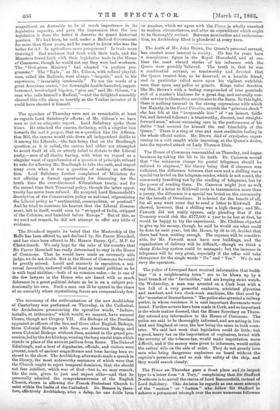The speeches of Thursday were not so remarkable, at least
as regards Lord Salisbury's efforts ; of Mr. Gibson's we have seen as yet no adequate report. Lord Salisbury spoke three times. He attacked the caucus, declaring, with a singular bias towards the ma/ a propos, that on a question like the Affirma- tion Bill, the caucus would ride down all independent dislike to it among the Liberals,—the fact being that on the Bradlaugh question, as it is called, the caucus had either not attempted to assert itself at all, or utterly failed to dictate to the Liberal party,—men of all shades having, with what we regard as a singular want of apprehension of a question of principle, refused to vote for allowing Mr. Bradlaugh to take the oath, and stayed away even when it was a question of making an affirma- tion. Lord Salisbury further complained of Ministers for not offering a formal opportunity for discussing for the tenth time the over-discussed Kilmainham treaty, and for the second time their Transvaal policy, though the latter oppor- tunity has never been refused. He accepted Lord Beaeonsfield's description of the Conservative policy as national, stigmatising the Liberal policy as "sentimental, cosmopolitan, or poetical." And he tried to convince his hearers that the Liberal Govern- ment, left to itself, would soon be "stripped of India, stripped of the Colonies, and humbled before Europe." But of this, as we need not remark, he did not attempt to offer any tittle of evidence.


































 Previous page
Previous page